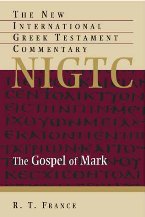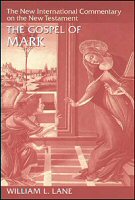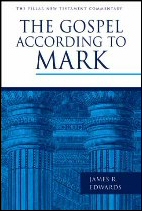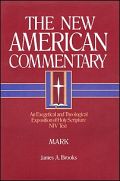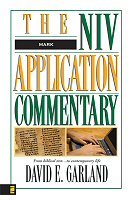Best Resources on Mark
The Gospel of Mark abruptly opens by proclaiming the good news of Jesus the Messiah (Mark 1:1). The story depicts Jesus and the kingdom of God that He announces as advancing against both worldly powers and supernatural forces. While the disciples consistently struggle to understand His mission, Jesus proceeds unflinchingly toward the cross. Along the way, He calls those who would follow Him to take up their own crosses (8:34–38).
The Gospel of Mark is attributed by early church fathers to John Mark, whose mother was a prominent member of the early church in Jerusalem (Acts 12:12). In the first century, it was not unusual for some Jews to have a Hebrew name (“John”) as well as a Greek one (“Mark”). Mark joined his cousin Barnabas and the Apostle Paul on their initial missionary journey (Acts 12:25; 13:5; Col 4:10). Somewhere along the way, he had a falling out with Paul, but they apparently reconciled in later years (Acts 15:37–40; 2 Tim 4:11; Phlm 24). Mark also is associated with the Apostle Peter’s ministry in Rome (1 Pet 5:13, where “Babylon” is generally understood to be a metaphorical reference to Rome). According to early Christian tradition, Peter told Mark all about Jesus’ earthly ministry, and Mark put these accounts in writing.
Among the four Gospels, Mark is likely the earliest. It might have been written even before Peter’s execution in Rome in the mid-60s AD. Because of Mark’s connection to Peter, the Gospel could have been addressed initially to the church in Rome. The Gospel may also have been written not long after the destruction of the Jerusalem temple in AD 70.
—Faithlife Study Bible, Lexham Press
Everything You Need to Study & Teach Mark
Expository Preaching Kits are curated resources all focused on helping you teach a single book of the Bible—keeping you prepared without weighing you down.
Best Commentaries on Mark
R. T. France, New International Greek Testament Commentary (NIGTC), Eerdmans, 2002, 756 pp.
This work is a commentary on Mark itself, not a commentary on commentaries of Mark. It deals immediately and directly with matters that France himself regards as important. Working from his own translation of the Greek text and culling from helpful research into the world of first-century Palestine, France provides an extensive introduction to Mark's Gospel followed by insightful section and verse commentary.
- Level: Advanced
- Type: Technical
William L. Lane, New International Commentary on the New Testament (NICNT), Eerdmans, 1974, 678 pp.
In this widely praised commentary by William L. Lane, Mark is revealed as a theologian whose primary intention was the strengthening of the people of God in a time of fiery persecution by Nero. Using redaction criticism as a hermeneutical approach for understanding the text and the intention of the evangelist, Lane considers the Gospel of Mark as a total literary work and describes Mark’s creative role in shaping the Gospel tradition and in exercising a conscious theological purpose. By taking care to indicate how the text was heard by Mark’s contemporaries while also placing the study of Mark within the frame of reference offered by modern Gospel research, Lane has constructed a thorough work useful to scholars and highly intelligible to nonspecialists.
- Level: Intermediate
- Type: Expository
James R. Edwards, Pillar New Testament Commentary (PNTC), Eerdmans, 2002, 552 pp.
Written by a biblical scholar who has devoted thirty years to the study of the second Gospel, this commentary aims primarily to interpret the Gospel of Mark according to its theological intentions and purposes, especially as they relate to the life and ministry of Jesus and the call to faith and discipleship. Unique features of James Edwards' approach include clear descriptions of key terms used by Mark and revealing discussion of the Gospel's literary features, including Mark's use of the "sandwich" technique and of imagistic motifs and irony. Edwards also proposes a new paradigm for interpreting the difficult "Little Apocalypse" of chapter 13, and he argues for a new understanding of Mark's controversial ending.
- Level: Intermediate
- Type: Expository
James A. Brooks, New American Commentary (NAC), B&H, 1991, 276 pp.
Decidedly evangelical and assuming the inerrancy of Scripture, this study examines the book of Mark from an exegetical and theological perspective. By exploring grammatical, textual, and contextual keys, Brooks unlocks the Gospel's meaning for readers living in the twenty-first century.
- Level: Intermediate
- Type: Expository
David E. Garland, NIV Application Commentary (NIVAC), Zondervan, 1996, 656 pp.
Mark displays Jesus Christ as the New Beginning, giving us all the chance to start over against at any time. The Gospel of Mark starts abruptly and has no ending, showing that Jesus makes it possible for the story of God, working in human history and in the Church, to go on and on.
- Level: Intermediate
- Type: Devotional
Best Books on Mark
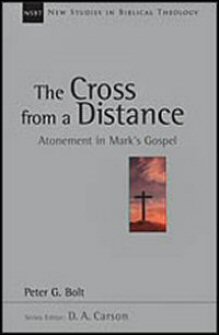
The Cross from a Distance: Atonement in Mark’s Gospel
Peter G. Bolt explores why the cross is so prominent in Mark’s Gospel. He asks what contribution Mark’s teaching can make to our understanding of the atonement. He shows how this teaching can inform, correct, and enrich our own preaching of the gospel in the contemporary world. He helps us to stand in wonder before God who has come close to us in the cross of Jesus Christ and to live in hope for the better things to come.
Learn more
A Theology of Mark: The Dynamic between Christology and Authentic Discipleship
Hans Bayer places Mark’s Gospel in its biblical context and explores the dynamic relationship between Jesus and his disciples. Focusing on the transformation that took place in the hearts of Jesus’ disciples, Bayer underscores their radical transformation from self-dependence to reliance on God.
Learn more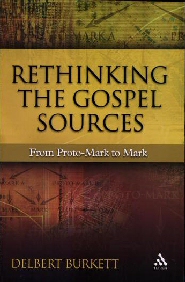
Rethinking the Gospel Sources: From Proto-Mark to Mark
Burkett offers a fresh reading of the much-debated “Synoptic Problem.” He contends that each theory regarding the Synoptic Problem is contentious. Each presents a case for the mutual dependence of one source upon another—for example, Matthew and Luke depend primarily on Mark, but use each other where they report the same story not contained already in Mark. Neither Mark nor Matthew nor Luke served as the source for the other two, but all depended on a set of earlier sources now lost. The connections between the Synoptic Gospels are more complex than simpler theories have assumed.
Learn more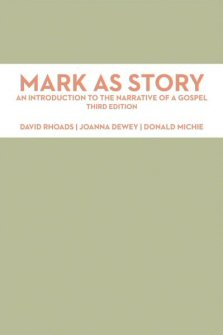
Mark as Story: An Introduction to the Narrative of a Gospel, 3rd ed.
In this third edition of Mark as Story, David Rhoads, Joanna Dewey, and Donald Michie take their treatment of the Gospel of Mark to new levels. While retaining their clear and thorough analysis of Mark as a narrative, they now place their study of Mark in the context of orality. The new preface explains the role of Mark in a predominantly oral culture. Throughout the study, they refer to the author as composer, the narrator as performer, the Gospel as oral composition, and the audience as gathered communities. The conclusion hypothesizes a performance scenario of Mark in Palestine shortly after the Roman-Judean War of AD 66–70.
Learn more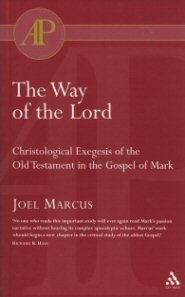
The Way of the Lord: Christological Exegesis of the Old Testament in the Gospel of Mark
The New Testament’s messianic interpretation of the Old is an important key to its theology. This book examines the way the author of the Gospel of Mark uses the Old Testament to convey the identity of Jesus. Joel Marcus examines in detail several important Markan passages that use the Old Testament. His central thesis is that Mark’s Old Testament usage follows paths already made by Jewish exegesis, particularly apocalyptic reinterpretations of Old Testament texts. Giving such eschatological exegesis his own characteristic twist, Mark presents Jesus as God’s true Messiah who brings the prophesied victory in eschatological holy war. Unlike the Jewish War against Rome in AD 66–72, however, the holy war portrayed by Mark is not fought with conventional weapons but won through the apocalyptic event of Jesus’ death and resurrection. This thoroughly documented and closely argued study is an important contribution to our understanding of the Gospel of Mark.
Learn moreBest Courses on Mark
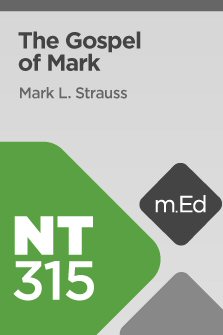
Mobile Ed: NT315 Book Study: The Gospel of Mark (8 hour course)
Enjoy an in-depth study of Mark’s Gospel from New Testament expert Dr. Mark Strauss. In this course, Dr. Strauss focuses on the words of Mark and the themes, theology, and purpose of the book. He describes the context of the Gospel as a whole, then examines the text passage by passage.
Learn more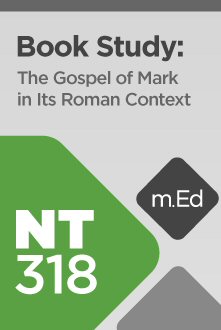
Mobile Ed: NT318 Book Study: The Gospel of Mark in Its Roman Context (8 hour course)
Explore the social settings, traditions, and historical setting, as well as the question of the authorship of Mark. Tackle the first half of Mark, which is dedicated to Jesus’ ministry in Galilee where he performed miracles, and the second half of Mark, which is focused on Jesus in Jerusalem and the passion. Discover the purpose of Mark’s Gospel, which is to present Jesus as God’s true Son who fulfills his mission on Earth. Dr. Craig Evans sheds light on the book of Mark and brings the text to life.
Learn more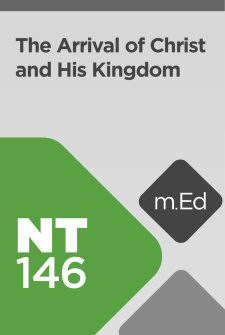
Mobile Ed: NT146 The Arrival of Christ and His Kingdom (2 hour course)
This insightful course on the arrival of Christ and his kingdom is presented by a team of respected Christian theologians, including Craig A. Evans, Michael W. Goheen, Jeannine K. Brown, Mark L. Strauss, Joel Willitts, and Gerry Breshears. These scholars are well published in biblical interpretation, biblical theology, and the New Testament, and their combined expertise will allow students to gain the clearest insight as they study the New Testament. This course covers new perspectives on the eschatological expectations of first-century Judaism, the birth of the Messiah in each Gospel, and Christ’s kingdom mission.
Learn more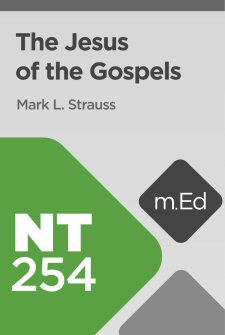
Mobile Ed: NT254 The Jesus of the Gospels (8 hour course)
The Jesus of the Gospels (NT254) focuses on the historical Jesus and the reliability of the four gospels. The course surveys different “quests” for the historical Jesus by critical scholarship and examines, apologetically, what we can demonstrate about the person of Jesus. It assesses the teaching of Jesus, his miracles, the intention of his ministry, and the historical evidence for his death and resurrection.
Learn more